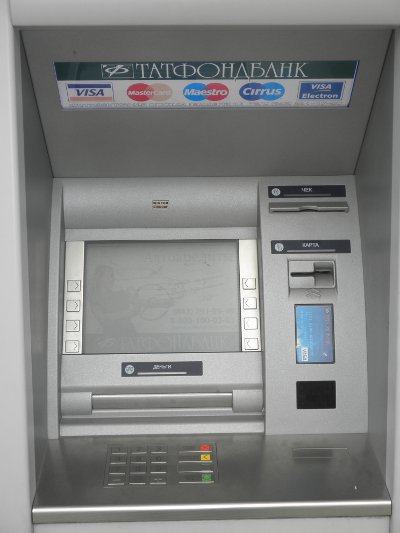Банкомат
The word for bank machine or ATM in Russian is банкомат. Back in the 80s there were essentially no banks in Russia in the sense of an ordinary bank in the US. Nowadays they are everywhere. And one of the chief ways to interact with a bank is through a bank machine:

| Я взяла две тысячи рублей в банкомате. | I got two thousand rubles from the ATM. |
| Мне нужны были деньги, но банкомат не работал. | I needed money, but the ATM wasn't working. |
| Не подскажете, где ближайший банкомат? | Could you tell me where the nearest bank machine is? |
| Я подошёл к банкомату, но в нём не было денег. | I went to the bank machine, but it was out of money. |
Just as in the States, to get money from an ATM you need a bank card банковская карта. Usually people will call it simply a карта, and sometimes they will call it кредитная карта. (Usually a bank card in Russia participates as well in the Visa or Mastercard system.) You also need a PIN number, which the Russians usually simply call a код, although it is also called ПИН-код (usually the first part is spelled with English letters, thus PIN-код) or личный код "personal code."
| Я всунул карту в банкомат, но он сразу же вернул её. | I put my card in the bank machine, but it immediately gave it back. |
| Я набрал свой код и проверил баланс. | I entered my PIN number and double-checked my balance. |
Just as in the States, a bank machine usually belongs to a particular bank. If you use ATMs owned by that bank, there are usually no withdraw fees. If you use one out of their system, there are:
| Я держу счёт в Сберанке России, и поэтому я пользуюсь только его банкоматами. | Sberbank Rossii holds my account, so I use only their bank machines. |
| Когда я пользуюсь банкоматами других банков, они берут проценты. | When I use ATMs that belong to other banks, they charge extra. |
That last example is interesting. «Берут проценты» really means "they charge a percentage." We Americans would expect that they charge a commission «берут комиссию», and that the commission would be a fixed fee. The commission in Russia is often not a fixed fee, but rather a percentage of the withdrawal, sometimes with a minimum amount of, say, $5. In this case phrase "they charge extra" is not a precise or technical translation of «они берут проценты». Instead it is a substitution of the most common English phrase used in that context for the most common Russian phrase used in the similar context.
3 comments
По-моему “… я пользуюсь только его банкоматами” звучит абсолютно нормально.
“… Я пользуюсь только их банкоматами” - тоже нормально, но я бы, пожалуй, так не сказал.
Дон, как всегда, супер-мега-убер-интересные посты! :-) Читаю с удовольствием.
I’m intrigued by the ‘его’ in the phrase ‘я пользуюсь только его банкоматами’ - if one translated the phrase directly from normal English usage, that would be ‘их’ (I only use their ATMs). Is this a misprint, or do Russians habitually use ‘its’ in preference to ‘their’ when talking about impersonal agglomerations?
Don responds: Right off the bat I can’t think of any context where их is used with a singular antecedent. For the moment I’d give this rule of thumb: If you can identify the antecedent, the possessive pronoun agrees with it in number and gender. In the case of the sentence you mentioned, the antecedent is Сбербанк, clearly masculine singular, hence его is used.
Я всунул карту в банкомат –> “вставил". “Засунул” and “всунул” are also possible, but they are clearly colloquial in this context("I stuck my card into the machine"). Probably, it is because in the sentence you use as an example, you really mean “insert” or something like this. There is a certain slot for your card, and you easily put a card inside with precise movements.
Я держу счёт в Сберанке России, и так я пользуюсь только его банкоматами.== Sberbank Rossii holds my account, so I use only their bank machines. –> The sentences are not equivalent, actually. “So” as a conjunction is “поэтому". Or maybe “так что” (the meaning is the same, i.e. “so", connecting the cause and the effect):
“Я держу счёт в Сбербанке России, (и) поэтому пользуюсь только его банкоматами.”
or you may just put two sentences together using “and", as the logical connection is pretty obvious:
“Я держу счёт в Сбербанке России, и пользуюсь только его банкоматами.”
“и так” is far from being a handy expression. Of course, given that I am a native speaker, I can make up a sentence with these two words. Or maybe even two. It’s going to take some time, though. I mean, it is nothing more than “and” + “so” ("in this manner") put together.
Don responds: Embarrassing. That use of «и так» is an error I am prone to make. Now is the time for me to finally get it right. The text has been corrected.
Form is loading...